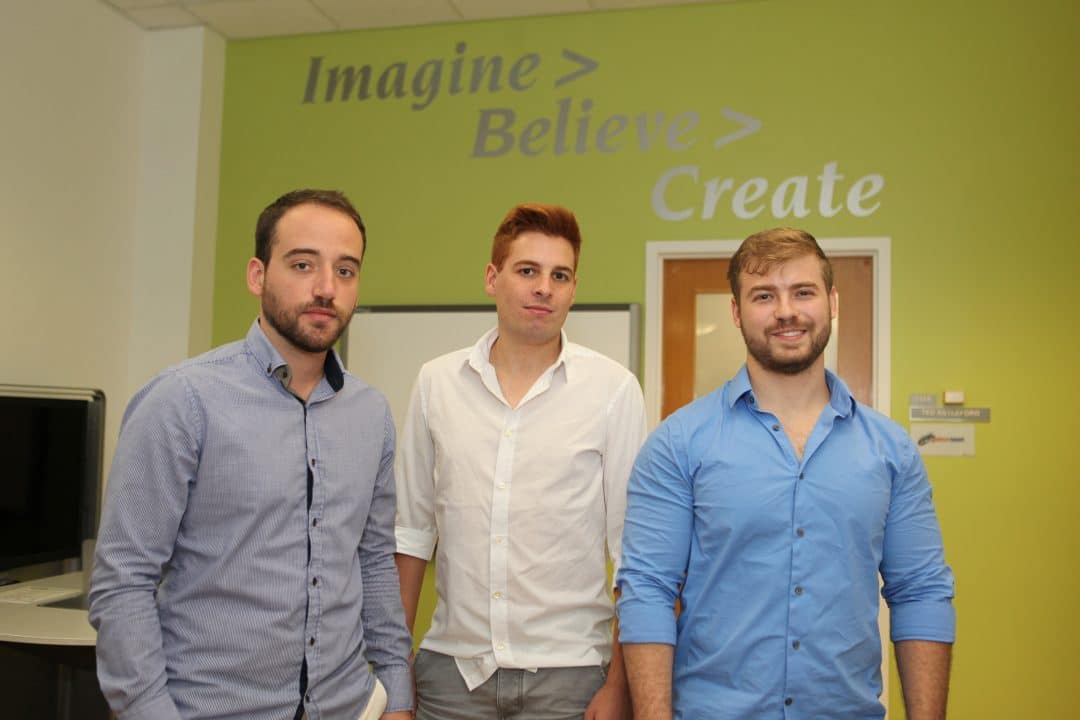MSE students say they have something “in store” for online giant
It’s difficult to disparage the convenience of online shopping. A couple of button pushes on your computer or mobile device, and the product you desire is on your doorstep in a few days.
But what if you really don’t want to wait a few days? What if you could get that specific or hard-to-find product right now, and all it would take is a short drive?
Nick Bevelock, Gordian Braun and Stelios Kapantais—students in the Thomas S. Johnson Master of Science in Entrepreneurship (MSE) Program—may have found the solution. They, along with 15 other hopefuls, will present their entrepreneurial concepts during the semifinals of the 2015 UF Big Idea Competition today and Friday at Heavener Hall.
The team’s concept is Lokire, an online marketplace where brick-and-mortar stores can compete with the likes of Amazon.
Lokire works like this: Local stores post their inventories online at Lokire, which updates each store’s offerings in real time. Through Lokire’s customer interface, shoppers can search for a specific product and be provided matches to those products from stores in a close proximity. Then, shoppers can choose the closest store and reserve or purchase those products.
Lokire provides something that Amazon, despite its enormous success and popularity, can’t: Instant gratification.
“In a best-case scenario where you have Amazon Prime, you’ll get your product in two days,” Bevelock said. “With Lokire, you can get it within an hour.”
Bevelock said Lokire is the type of innovation that would “bring efficiency to local shopping and bring it into the 21st Century.” He said the team’s research uncovered that 1 in 4 customers avoid brick-and-mortar stores because of a “limited awareness of nearby stores or the risk of items not being available.” Lokire solves both of those issues.
Plus, those brick-and-mortar stores receive an obvious and huge benefit from having more foot traffic in their establishments. Those shoppers are more likely to make supplemental purchases. Additionally, if they have a good experience, they’re likely to return.
Lokire’s roots began as a class project Braun devised. As the team continued to work on the project, they realized Lokire had potential as an actual business.
“When we were writing our business plan, one of the sections was a market analysis,” Bevelock said. “That’s what solidified it for us. We thought there was a real opportunity here, and we should pursue it.”
That market analysis showed that while online purchases have become increasingly popular, the most common method is ROPO (Research Online, Purchase Offline). According to a 2014 report from retail firm Interactions, 88 percent of consumers review products online before ultimately purchasing them in stores. Lokire is hoping to leverage that trend.
“There is no dedicated place on the Web where they can go and find this information,” Bevelock said. “If they do, it’s a quick Google search and not very accurate. They don’t know if it the product is there or the size they have it in. Our concept would solve all these different variables.”
The team’s makeup is a unique blend. Braun, a native of Mannheim, Germany, has international experience as an attorney, banker and entrepreneur; Kapantais, of Athens, Greece, is a seasoned businessman with experience in marketing and managing apparel shops; and Bevelock, has a BS in Microbiology from UF, where his focus was creating and researching mutant bacteria for the production of biofuels.
Kapantais said he is confident in the team’s chances this weekend.
“We believe we can do it,” Kapantais said. “I think we have one of the best business plans in the event. Also, just the feedback we’ll get from the judges and entrepreneurs will be valuable.”
Winning the competition would not only be a major confidence boost for the team, but the first place prize of $25,000 would be a significant addition to their fundraising initiative. Braun said the team is seeking investments totaling $1.5 million for the company’s first two years of operations.
“This competition is very important to us,” Braun said.
About the Big Idea Competition
Today: Sixteen semifinalists, divided into four groups, will take part in oral presentations and question-and-answer sessions with judges in Heavener Hall. The four group winners advance to Friday’s final round at Emerson Alumni Hall.
Friday: The remaining four teams make their final presentations, and the winners will be announced at a banquet later that evening at Emerson Alumni Hall.
First place is awarded $25,000, second place receives $10,000 and third place receives $5,000.




